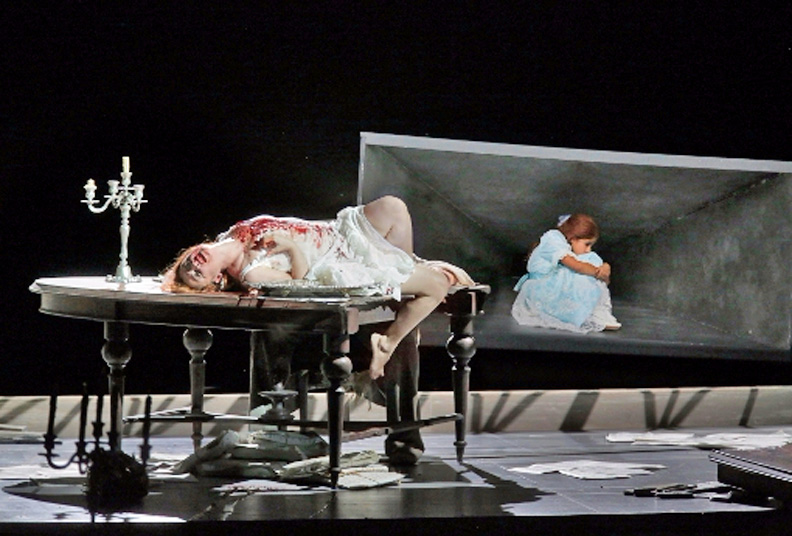
Strauss: Salome. Santa Fe Opera, 2015
The last time I saw Salome at Santa Fe, the back of the stage was open so the audience had a view of the beautiful Sandia mountains of New Mexico and it was easy to imagine them being the Judean Hills where Strauss’s opera, and the preceding Oscar Wilde play, are set.
With the new production this summer, the back of the stage was closed. The story was shifted from biblical times to circa 1905. That was when Strauss composed the opera and when Freud wrote Three Essays on the Theory of Sexuality about psychosexual development taking place in childhood with the build-up of frustrated libido.
Freud also defined Übertragung, or transference, as “the inappropriate repetition in the present of a relationship that was important in a person’s childhood.”
Director Daniel Slater here depicts John the Baptist not in a cistern but with a pen and papers in a library or office suggestive of Freud’s workplace, and he posits that Jochanaan was imprisoned for a long period in the same place where Salome’s father had been held captive. Salome’s father eventually was murdered by his brother, who now rules as King Herod, in a manner suggestive of Claudius killing his brother in Hamlet. A re-enactment of the king’s murder seems to come directly from the dumbshow in Act III of Shakespeare’s play.
Salome’s dance is not a strip-tease but rather an interlude in which she goes back into her memory and removes veils of denial as she remembers molestation by Herod when she was a child. This sexual abuse she now transfers to the prophet Jochanaan.
All in all I found this interpretation fascinating but not definitive. I want to return to Judea in the time of Flavius Josephus or Saints Mark and Matthew, but there were many moments when this production was enthralling.
The opening scene, normally outdoors on King Herod’s terrace, is an indoor banquet table with men in fancy military regalia that suggest Franz Josef’s Hapsburg Empire (Freud’s homeland) or Kaiser Wilhelm’s Germany (Strauss’s). Everybody in this court is militaristic, including the “Five Jews” who argue religious matters in Strauss’s libretto. Their transposition into soldiers makes no sense.
Alex Penda in the title role was able to hold our attention even with all her veils in place. The slender, auburn-haired Penda was convincing as a petulant teenager and even more compelling when she became a blood-thirsty psychopath. The last moments when she finally kisses the lips of the prophet were powerful theater. Her voice seemed weak in the early scenes but took on power during her demands that Herod bring her Jochanaan’s head on a silver platter.
The disintegration of Herod was keenly defined by Robert Brubaker, who provided more tonal luster than we usually hear in the role. But Slater’s direction let him down in the closing scene. There, in a moment of confusion, he’s supposed to give his ring to the executioner, thus ordering the beheading of John the Baptist. Slater had Brubaker angrily throw his ring into the wings; how the executioner received the ring and took this to be directive for a beheading we’ll never know.
Totally ignored is the specification for Herod to sing “Kill this woman” whereupon the guards crush her to death with their shields. Here, this Salome dies in a sort of immaculate destruction.
Mezzo-soprano Michaela Martens was a domineering Herodias, Ryan McKinny an effective Jochanaan, and tenor Brian Jagde a sensitive Narraboth, the captain of the guard. David Robertson led the orchestra with sweeping power and expert attention to instrumental details.
Read more reviews on The Cultural Critic